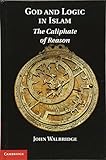God and logic in Islam : the caliphate of reason John Walbridge.
Material type: TextPublication details: Cambridge ; New York : Cambridge University Press, 2011.Description: xvi, 211 p. : ill. ; 24 cmISBN:
TextPublication details: Cambridge ; New York : Cambridge University Press, 2011.Description: xvi, 211 p. : ill. ; 24 cmISBN: - 9780521195348
- 0521195349
- B 745.R4 WAL 22
- B745.R4 W35 2011
| Item type | Current library | Collection | Call number | Status | Date due | Barcode | Item holds | |
|---|---|---|---|---|---|---|---|---|
 Books
Books
|
JST Library General Stacks | B<br>Philosophy (General) | B 745.R4 WAL (Browse shelf(Opens below)) | Available | 106325 |
Browsing JST Library shelves, Shelving location: General Stacks, Collection: B<br>Philosophy (General) Close shelf browser (Hides shelf browser)

|

|

|

|
No cover image available |

|

|
||
| B 745.G63 NET Allāh transcendent: | B 745.G63 YAR Islamic thought on the existence of God : | B 745.M4 SAD The book of metaphysical penetrations : | B 745.R4 WAL God and logic in Islam : | B 748.A23 BER Averroes' : | B 749.K372 AVE Faith and reason in Islam : Averroes' exposition of religious arguments / | B 751.Q33 ALI Avicenna's Allegory on the soul: |
Includes bibliographical references (p. 187-202) and index.
1. Introduction -- Part I. The formation of the Islamic tradition of reason: 1. The problem of reason in Islam: is Islam a non-rational religion and civilization?; 2. The diversity of reason; 3. Empirical knowledge of the mind of God; 4. The failure of the Fārābian synthesis of religion and philosophy; 5. Mysticism, post-classical Islamic philosophy, and the rise and fall of Islamic science -- Part II. Logic, education, and doubt: 6. Where is Islamic logic?: the triumph of scholastic rationalism in Islamic education; 7. The long afternoon of Islamic logic; 8. The institutionalization of disagreement -- Part III. The fall and the future of Islamic rationalism: 9. The decline and fall of scholastic reason in Islam; 10. A chaos of certitudes: the future of Islamic reason.
"This book investigates the central role of reason in Islamic intellectual life. Despite widespread characterization of Islam as a system of belief based only on revelation, John Walbridge argues that rational methods, not fundamentalism, have characterized Islamic law, philosophy and education since the medieval period. His research demonstrates that this medieval Islamic rational tradition was opposed by both modernists and fundamentalists, resulting in a general collapse of traditional Islamic intellectual life and its replacement by more modern but far shallower forms of thought. However, the resources of this Islamic scholarly tradition remain an integral part of the Islamic intellectual tradition and will prove vital to its revival. The future of Islam, Walbridge argues, will be marked by a return to rationalism"--Provided by publisher.
There are no comments on this title.

